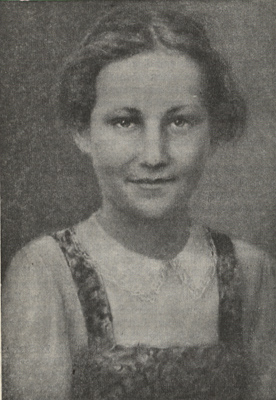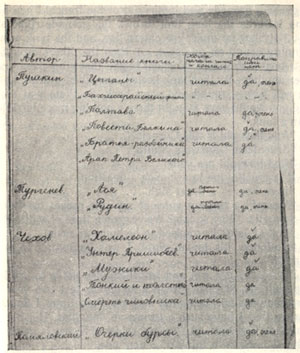

|
| Zoya Kosmodemyanskaya in 1937 |
I began to discuss money matters with the children very early.
In 1937, 1 remember, we opened a savings account and solemnly deposited our first seventy-five rubles. Every time we were able to save a little money near the end of the month, Zoya would take it to the savings bank, even when the amount was only some fifteen or twenty rubles.
Now another expense item had appeared on our list: Bank Account No. 159782, to which citizens of the U.S.S.R. sent money collected for the women and children of Republican Spain.
Shura thought of it first. "Zoya and I can spend less on lunch."
"No," I said, "we won't touch the lunches. Now if you were to miss one or two football games—that would be all to the good…
We kept a list of the most necessary things: Zoya has no mittens, Shura's shoes are falling to pieces, my galoshes have a hole in them. Apart from this, Shura's paints have run out, and Zoya needs some threads for embroidery. The list often gave rise to argument; the children always insisted on buying first what I needed.
Books were our favourite expense item.
What a pleasure it is to walk into a bookshop, to rummage about among the books lying on the counter, to step back, and standing on your toes with your head on one side, to read the titles on the backs of the books ranged closely along the top shelves; then, unhurriedly, to look through them and discuss their merits…and, finally, to come back home with a heavy neatly wrapped package! The day when a new book graced our bookcase (it used to stand in the corner, at the head of Zoya's bed) was a great treat for us. Again and again we would mention our new purchase. We would read the new book in turns, and sometimes aloud on Sunday evenings.
One book which we read like that was a collection of true stories called Women in the Civil War. I remember I sat darning stockings, Shura was painting, and Zoya opened the book to read. Unexpectedly Shura said, "I say, don't read them in order. Just open it at random, and we'll begin with the first one that turns up."
I really do not know what put this idea in Shura's head, but we decided to adopt his plan. The first story we read was "Tanya Solomakha." It was about a village schoolteacher and contained the notes of three people: those of her brother, Grisha Polovinko, one of her pupils, and her younger sister.
Her brother told about Tanya's childhood, how she grew up, studied, how she loved reading. There was one place there which made Zoya stop and glance at me. The lines were about how Tanya read The Gadfly aloud; late at night Tanya finished reading the book and said to her brother, "And do you think I don't know what I am living for? I feel I could give up my blood, drop after drop, so that people might live better."
After graduating from high school Tanya began to teach in a Kuban village. On the eve of the revolution she joined an underground Bolshevik organization, and during the Civil War—a Red Guard detachment.
In November 1918 the Whites broke into Kozminskoye Village, where Tanya lay ill with typhus. They put the sick girl in prison and tortured her in the hope that she would betray her comrades.
 |
A page out of Zoya's notebook on the Soviet Constitution Under the heading: "universal Military Service" Zoya groups the following points: 1) capitalist encirclement and the tasks of defending the U.S.S.R.: 2) the Red Army as a powerful guardian of the Soviet Land: 3) the attitude of the Soviet people to the Red Army; 4) the armies of the capitalist countries as instruments for the oppression of the working people. Under the heading: "To defend the country is the sacred duty of every citizen of the U.S.S.R." come: 1) the oath of allegiance as a solemn and inviolable duty: 2) treason to the Motherland as the most heinous of crimes; 3) the necessity for strengthening the defences of the U.S.S.R. Under the heading: "The Electoral System of the U.S.S.R.' the first point is: universal, equal and direct suffrage by secret ballot |
Grisha Polovinko wrote how he and his classmates had gone to the prison. They wanted to see their teacher and help her. They saw how Tanya, bruised and bloody, was brought out into the yard and placed against a wall. The boy was amazed to see how calm her face was, which expressed neither fear, nor prayer for mercy, nor even pain from the torture she had just endured. Wide-eyed she gazed at the gathered crowd.
Suddenly she raised her hand and said in a loud clear voice, "You can beat me as much as you like, you can murder me, but the Soviets are not dead—the Soviets are alive. They will come back!"
A Cossack sergeant lashed out at Tanya with a ramrod and slit open her shoulder. The drunken Cossacks threw themselves upon her, kicking her and beating her with the butts of their rifles. "I'll make you beg for mercy!" the sergeant-executioner shouted at her, and, wiping the blood which streamed down her face, Tanya answered, "You never will! I won't beg anything from you!"
And Zoya read on how again and again, day after clay, Tanya was tortured. The Whites revenged themselves on her for not crying out, for not begging for mercy, for looking bravely in the faces of her tormentors…
Zoya put the book down, stood up and crossed towards the window, and stood there for a long time without turning round. She rarely cried, and did not like others to see her tears.
Shura who had abandoned his album and paints as soon as the reading began, picked up the book and began to read on further. Raya Solomakha, Tanya's sister, wrote: 'This is what I learnt about her death. At dawn on November 7 the Cossacks rushed into the prison. They began to club the prisoners with their rifle butts and drive them out of the cell. At the door Tanya turned round to those who were left.
"'Good-bye, Comrades!' her calm voice rang out. 'May the blood on these walls not have been shed in vain! The Soviets are coming!'
"In the early frosty morning, outside the common pasture, the Whites sabred eighteen heroes. Tanya was the last to fall. True to her word, she did not beg for mercy from her executioners."
I remember that it was not only Zoya who was moved to tears by the amazing strength and purity of Tanya's character.
Next: Their First Earnings
